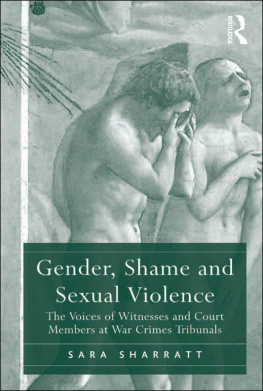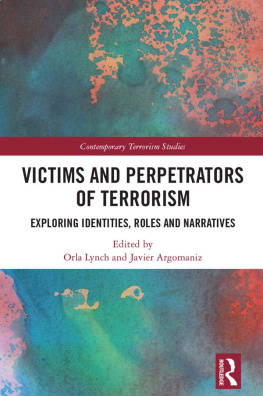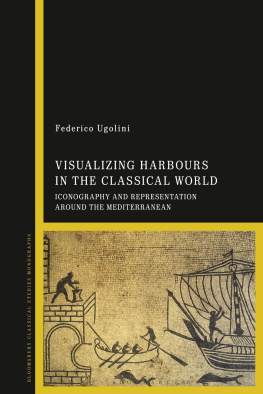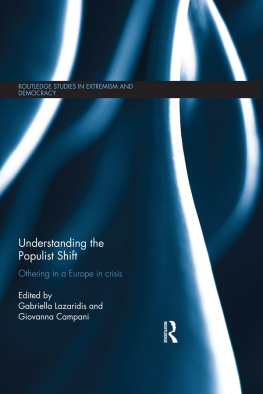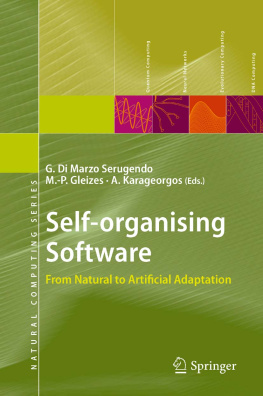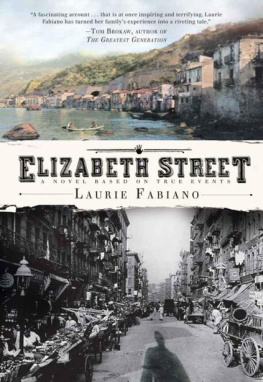I N EMBARKING ON MY OWN REPRESENTATIONAL CHALLENGE BY writing this book, I feel deeply grateful. This research would not have been possible without the help of many persons who, in different ways, supported, challenged, provoked, encouraged, and cared for me and this creative enterprise.
I want to thank all the women who generously shared their lives and stories with me: first, the Macaremy beloved sisters and teachersand the women of Unione delle Donne in Italia (Union of Women in Italy, or UDI). I thank you for your trust, for the many memorable moments spent together, for the warmth and generosity that you showed me since we met in 2011. I cherish your presence in my life and the many life lessons I learned by spending time with you. I hope that I do justice, in this book, to the beauty, complexity, passion, and political drive that animate your lives and that make you the exceptional human beings you are.
A special thanks to Pina Nuzzo, whose insights and political vision are always as elegant and lucid as her art. The ways in which your two passionsart and politicsintertwine in your life and political activism is always a source of inspiration for me. I am deeply grateful for your trust and for the intellectual and emotional labor you put into trying to find the right language for me to understand your artistic and political visions.
I thank DNA Donna, Laboratorio Donnae, Io Sono Bellissima, Cooperativa San Francesco, Flauto Magico, Femministe Nove, Evaluna, Donne Insieme, Agedo, LeA, UDI Modena, UDI Pesaro, Spazio Donna, Laboratorio Zarcar, Libreria Idrusa, Annacinzia Villani, Comune di Soleto, Comune di Sogliano Cavour, Comune di Presicce, Criamu, Panico Tamburi a Cornice, SoniBoni, Mascarimir, Scuola di Counseling Espero, Le Costantine, Canali Creativi, and Giovanni from ANSA.
I am also particularly grateful to Enza, Loredana, Melania, Milena, Mac, Maria Antonietta, Marisa, Lidia, Lorenza, Claudia, Sabrina, Nadia, Lisa, Erica, Lara, Miriam, Maria Grazia, Francesca, Monica, Ilaria, Ingrid, Judith, Viola, Simonetta, Antonella, Cristina, Valentina, Rossella, Debora, Lori, Monica, Stefania, Caterina, Roberta, Federica, Letizia, Annalisa, Rita, Annarita, Rina, Caterina, Roberta, Brigitte, Ada, Silvia, Lucia, Giulia, Vania, Annarita, Saveria, Anna Maria, Roberta, Roberta, Moira, Leila, Oriana, Vita, Tina, Helen, Marina, Lucia, Mariarosaria, Beatrice, Sabina, Nicoletta, Cristina, Francesca, Giuliana, Emanuela, Pilar, Ross, Raffaela, Ingrid, Ilaria, Anna Maria, Marianna, Maria Ada, and Elide. Thank you for your help, support, and friendship.
My gratitude goes also to Eunice, Steve, Eric, Jasmine, the Villas, the Belcastros, the Baroccis, Carolina, Salvatore, Rosamarina, Virginie, Claudio M., Elena, Fabio, Alina, Arjeta, Vincenzo, Rosa, Ulrike, Kelsi, Nonno Mario, the Galli family, the Monai family, the Zappa family, Annette, and Morgana.
A special thanks to Alessandra Bianco, whose help in obtaining the copyright of some of the images proved to be crucial, and to Pina Nuzzo, Enza Miceli, Maria Antonietta Nuzzo, and Lucia Sabato for their art, photos, and insights. I am grateful to Manuela Pellegrino, Nicoletta Nuzzo, Francesco Manni, Barbara Spinelli, Giovanni Pizza, Giovanna Zapperi, Alessandra Gribaldo, Loredana De Vitis, and Stefano Santachiara for sharing with me some of their research or materials.
I am especially grateful to the Anthropology Department at the University of Toronto and for the support of the Connaught Scholarship throughout my doctoral period.
A particular thanks to Andrea Muehlebach, Valentina Napolitano, Naisargi Dave, and Michael Lambek, whose stimulating and compelling insights were of key importance in my personal and academic growth: thank you for helping me think through my material and articulate my arguments with greater clarity. Thanks also to Natalia Krencil, for the invaluable help and support she provided in navigating the university bureaucracy. Thanks to Ivan Kalmar, Rita Astuti, Maurice Bloch, Fenella Cannell, Ugo Fabietti, and Aurora Donzelli for having supported me during the early stages of my postgraduate studies.
I am deeply grateful to Michal Herzfeld, whose engagement with my work was crucial: thank you for pushing me to elaborate further my arguments and writing style and to make my book, and my scholarship, a better one. Many thanks to Jennika Baines, Kate Schramm, and Indiana University Press for the support, encouragement, and dedication throughout the publication process. My gratitude also goes to the anonymous reviewers whose insights, suggestions, and passionate encouragement really made a difference in the final version of this book and in my authorship.
Aspects of this research appeared in the journal Modern Italy: I thank the editorial board and the anonymous reviewers for the insightful comments and suggestions.
I want to thank all the persons who, in different ways and occasions, have engaged with part of the text or arguments of the book: your insights, comments, challenges, and critical feedback have been of great importance to me and to this project. Thanks to Salvatore Giusto, Veronica Buffon, Letha Victor, Annalisa Butticci, Maria Efthymiou, Veena Das, Michael Jackson, Charles Stewart, Stavroula Pypirou, Giovanni Pizza, Flavia Laviosa, Deborah A. Thompson, Lisa M. Stevenson, Gino di Mitri, John Kloppenborg, Marco Rizzi, Francis Cody, Megan Raschig, Laura McTighe, Emily Ng, Elisa Lanari, Aditi Surie von Czechowski, Sabina Perrino, Sabina Izzo, Gregory Kohler, Andrea Leone-Pizzighella, Zachary Androus, Alexandra Cotofana, Laurian Bowles, Manuela Pellegrino, Mariela Nuez-Janes, Beth Uzwiak, Jessica Santos, Barbara Di Gennaro, Mauro Belcastro, Juliann Vitullo, Tania Rispoli, and the audiences of my papers.
A special thanks to both the Science, Religion, and Culture Program and the Center for the Study of World Religions at Harvard Divinity Schoolin particular to Ahmed Ragab and Charles Stang. The welcoming culture and the intellectual richness of these environments are, for me, an invaluable source of personal and scholarly growth.


